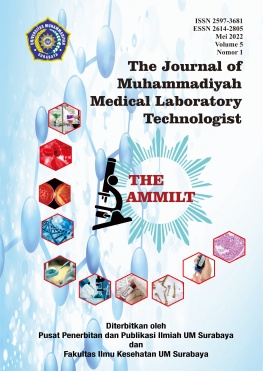Isi Artikel Utama
Abstrak
Diabetes mellitus is a chronic metabolic disease characterized by a state of hyperglycemia due to a lack of insulin production by the pancreas or the body's inability to use the insulin produced or both. Uncontrolled hyperglycemia can suppress the immune system and making the body vulnerable to infection, especially urinary tract infections (UTIs). The main choice in UTI treatment is antibiotic therapy, one of the most frequently used is ciprofloxacin from the fluoroquinolone group.
The research design used was descriptive method with prevalence studies. The research was done using antibiotic sensitivity tests with agar diffusion methods. The number of samples were taken using total sampling method.
The results of ciprofloxacin sensitivity test were obtained as many as 22 isolates. Escherichia coli bacteria are sensitive to ciprofloxacin at 66.67%, intermediate and resistant 16.67% respectively. Pseudomonas aeruginosa are 60% sensitive and 40% intermediate. Enterobacter aerogenes are 66,67% sensitive and 33,33% intermediate. Shigella spp. are 100% sensitive, and Klebsiella spp. 100% resistant.
The conclusion from the study showed that ciprofloxacin are an effective empirical therapy for UTI.
